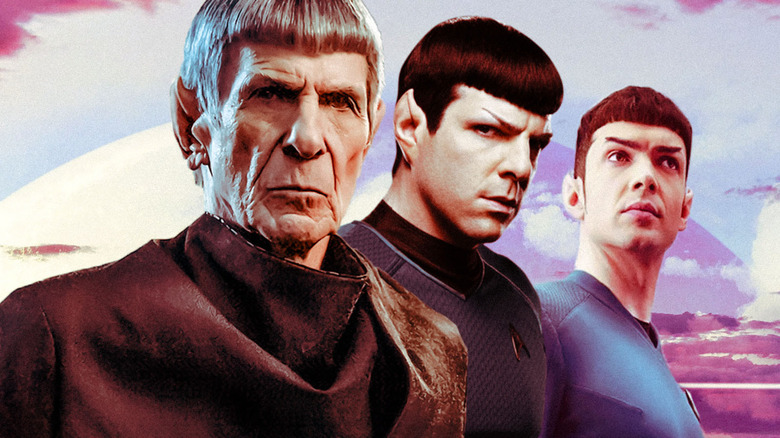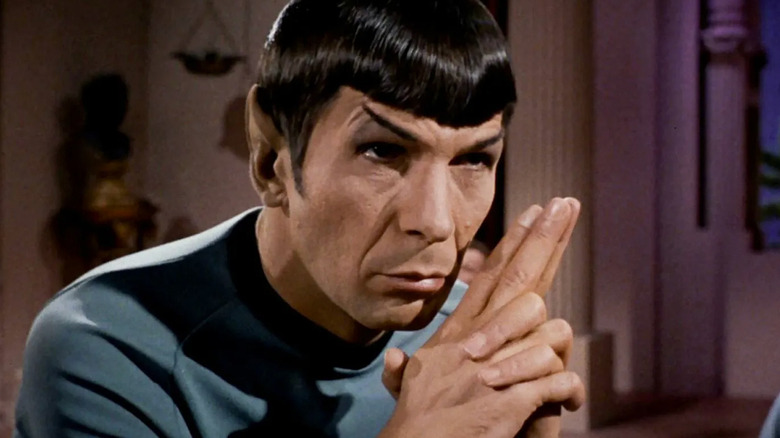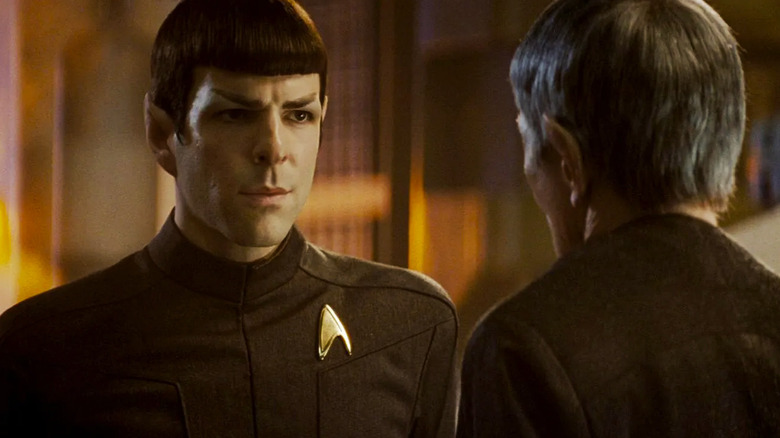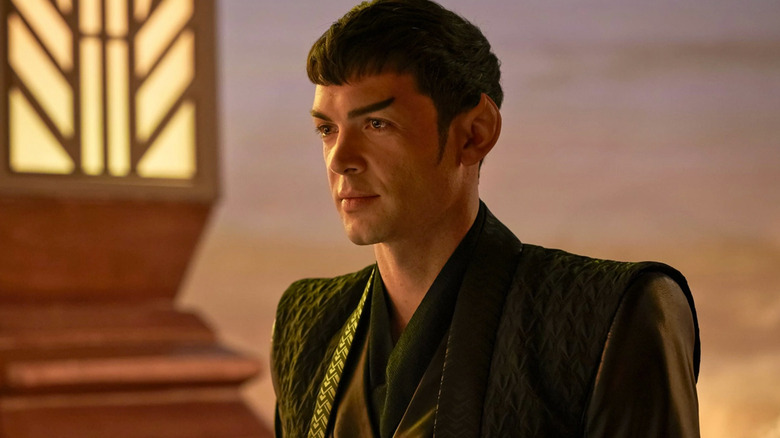There Has Never Been A Bad Spock Actor
In a world driven almost exclusively by a cycle of regenerating IP, you're bound to see your favorite franchise reboot itself at least once in your lifetime. Such is the case with "Star Trek," which has effectively resurrected its "Original Series" characters twice: in J.J. Abrams' alternate reality-set "Trek" films, and in the shows "Star Trek: Discovery" and "Star Trek: Strange New Worlds." That means that there are at least three interpretations of Captain James T. Kirk — and of his first officer, Spock.
This has become a prickly subject for some fans, especially those protective over the original Spock, Leonard Nimoy, and his formidable legacy. Nimoy will always be the OG, but that doesn't mean that Zachary Quinto and Ethan Peck — his successors in the Abramsverse and in the prime timeline shows, respectively — aren't worth celebrating in kind. The truth is, the "Trek" universe has been careful when it comes to Spock. They don't take Nimoy's legacy lightly, and neither do Quinto and Peck.
Nimoy laid the foundation
It's hard to find any fault in Nimoy's interpretation of Spock, given that the character wouldn't exist at all without the late actor. Nimoy was the inspiration behind Spock's most iconic quirks, even providing the inspiration for the Vulcan salute and efficient nerve pinch. But there are quite a few intangible reasons why Spock has become such a timeless figure, and most of them can be traced back to Nimoy's grounded, gentle approach to the character.
There's a reason why Spock — and, by extension, Nimoy — resonates with so many people. He's an outcast wherever he goes: his half-human heritage makes him an aberration on Vulcan, and his staunch constraint over his emotions has the same effect on the U.S.S. Enterprise. He's constantly at war with himself, struggling to reconcile his two identities, but Nimoy lent such a dignity and grace to the character that one hardly notices — except, of course, in episodes that used that conflict as a conceit.
The Spock of the original series is rarely entirely aloof or entirely reliant on his emotions. He does lose control every once in a while, as seen in episodes like "Amok Time," but he strives to express the best parts of his humanity in tandem with the virtues of logic whenever possible. He knows himself, he knows his duty, and he's resigned to it, but rarely with any bitterness or regret. He's essentially the best of two worlds, and on a show that leaned into the psychedelic camp of the '70s, Spock was more than a straight man. He was the heart of "The Original Series," and he'd go on to represent the franchise at its absolute best.
Zachary Quinto explored new territory
When it comes to Spock, Leonard Nimoy left some truly massive shoes to fill. Taking on such an enigmatic character couldn't have been an easy task for Zachary Quinto. Fortunately for him, Nimoy personally approved of his casting, and was there to answer any questions he had about Spock when preparing for the "Star Trek" reboot.
Not every Trekkie is a fan of Abrams' reimagined Enterprise crew, but Quinto's Spock is both a comfortable reminder of the past (especially when he and Nimoy's Spock meet face to face) and a fresh take on what makes the character so compelling. One notable change in the Kelvin timeline is Spock's more volatile nature: What was once a mostly-internalized conflict between his human and Vulcan halves plays out ostensibly throughout the "Trek" reboot. Quinto's Spock may be the most soulful and soft-spoken, but his grasp on his emotions is precarious at best. His adventures on the Enterprise force him to reckon with all kinds of devastating emotions, some of them beyond even his understanding.
We've seen Spock lose control before, but usually while under the influence of one alien substance or another. In "Star Trek," he's grappling with the destruction of his planet, the loss of his mother, and an interspecies relationship all at the same time. To see his depth of emotion brought to the surface so organically, and by way of Quinto's fierce commitment, is always such a treat. Quinto really does capture the essence of the man that Nimoy built from the ground up, and he doesn't seem afraid to inform the character with a few of his own experiences too.
Ethan Peck forged a path on his own
Unlike Quinto, Ethan Peck was pretty much on his own when it came to his version of Spock. His casting in "Star Trek: Discovery" was announced three years after the death of Leonard Nimoy, and almost a decade after Quinto first delivered his own take on Spock. Peck would have two previous versions of the character to contend with, but also two versions that could inform his own.
Peck's approach to the character was a strategic, moment-to-moment exploration, a process that he detailed to /Film's Jacob Hall:
"In the beginning, when I was working on 'Discovery' ... it was really kind of like, who am I speaking to? Am I feeling open with them? Is this a moment of pure logic? Is this a time to be emotionless and calculating, coldly so? Or is this a moment with Michael Burnham, let's say, or Captain Pike, when I can be a little bit more expressive and let something through, or can't help myself but to let something through?"
Peck puts a lot of work into his version of Spock, and it definitely shows ... not in a bad way, of course. It's more like Peck has absorbed everything he could from Nimoy, distilled the essence of his Spock, and let it live on in his own performance. That Peck is portraying a younger version of the character definitely softens the blow of any discrepancies — but for the record, there are very, very few.
Peck has a ways to go (roughly ten in-universe years) before he becomes the Spock of the "Original Series," and watching him bridge that gap bit by bit is insanely gratifying. It goes to show that different or new isn't necessarily bad, and the same can be said for Quinto's Spock. It's not about doing a parody of Nimoy, but about keeping his legacy fresh and alive. The character can evolve without tarnishing the work that came before. And by that logic, there is no "bad" or even "lesser" Spock: Just different Spocks for different times.



